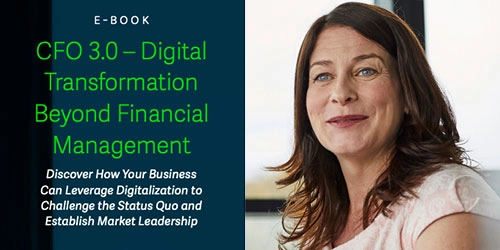Digital Transformation Beyond Finance: CFO 3.0
As finance technology evolves so does productivity and performance, changing the way work gets done. The most forward-thinking companies rise to the challenge and embrace this digital transformation. While digitalization is nothing new, the speed of innovation is changing the accounting profession entirely. Instead of replacing traditional systems, leaders are adapting their business models to new technology to provide better service and meet shifting customer demands.
The modern CFO has been on a journey from CFO 1.0 (looking behind them) to CFO 2.0 (living in the present) to today’s CFO 3.0 (anticipating and providing unique insights into the future of their organization).
Seeking to understand this journey, Sage surveyed over 500 CFOs for their thoughts on what the future may hold and to understand the impact technology has on their daily work life.
Report: CFO 3.0 Digital Transformation Beyond Financial Management
The findings show that the finance role has transformed faster over the last five years than any time in history. And, while many are eager to take advantage of technological innovations, the pressures of the job have prevented them from mastering new skills.
The results also demonstrated that generational attitudes are also a strong driver of change. Millennials and Generation Z are comfortable with the latest technology, remote working, and adapting social channels to their work life. To be able to keep this talent engaged leaders need to exhibit the same values.
CFO 1.0: Finance Is Looking Behind
The earliest state was CFO 1.0, the first generation Chief Financial Officer, steward of the company books. Their role was historian, using financial reporting tools that show what happened yesterday, last week, or last month, instead of forecasting future potential.
Their priority was accurate reporting of what happened. However, recently, there has been a drastic change in how people work. For the most part, people are mobile, social, and comfortable with change. Millennials especially are data-savvy and unconcerned by blurring personal and professional lives. Their expectations for technology are high—in fact, they expect it to be able to solve nearly anything. And it’s not just the inter-generational interaction that has led to adoption—it’s also the fact that technology has become more intuitive. Significantly, we trust technology.
CFO 2.0: Finance Is Living in the Present
Today’s CFOs mainly fall into the CFO 2.0 state, where they analyze data in the present. They see the benefit automation tools have on productivity and its ability to take on burdensome daily tasks. They have eliminated many of the manual, time-consuming tasks from the CFO 1.0 era. Cloud based financial and business intelligence tools, and new user-friendly finance apps keep data as up to date as possible. But, while they may have adopted modern tools and technology, they aren’t able to look at the road ahead.
At this stage CFOs are starting to move in a more strategic direction. The obstacle they face is the inability to forecast what will happen within their business in the future. Their lack of understanding or willingness to expand their skill set to include AI or ML prevent the transition from CFO 2.0 to 3.0.
CFO 3.0: Finance Is Anticipating the Future
With the rise of CFO 3.0 emerges a new era where Robotic Process Automation (RPA), Artificial Intelligence (AI) and Machine Learning (ML) empower forward-thinking finance trailblazers. Pushing the boundaries of digital transformation, these visionaries embrace new approaches including predictive analytics.
AI and ML are the logical next step in automation but they are also able to take the role of finance so much further along the digitalization journey. This is evident in job postings for AI—technology is driving the creation of new previously unheard-of roles like “conversation designer.” With new demand for these skills there are massive shortages, providing a huge opportunity for finance professionals.
Technology Advances are Paving the Way for a New Era
Innovations in technology are giving us a glimpse into the future of accountancy. Instead of relying on intuition, leaders have information readily available to make instant decisions. No longer are strategic decisions based on guesswork, but data driven. The rise of AI and ML mean data entry and bookkeeping skills will continue to be replaced by automation. While that will displace some jobs it will create many new opportunities.
Today’s best-in-class CFO is already a strategic leader and visionary. CFO 3.0 leverages technology to take that vision further. CFO 3.0 can no longer rely on only finance skills; they must have business management expertise required in the C-Suite. Their holistic view and insight into the financial health of the business makes them uniquely positioned to lead.
For CFOs, technology has provided the journey to becoming a visionary and an essential strategic partner to the CEO. Because of the changes in the role of the CFO, if they choose to they can create a clear path to become a CEO. If you’re ready to embark on a new journey, the door to leadership is open, in world of CFO 3.0. Download the full report to walk the path of the modern CFO.






